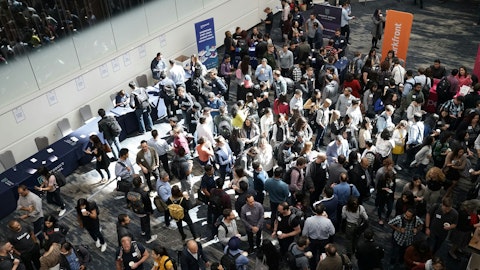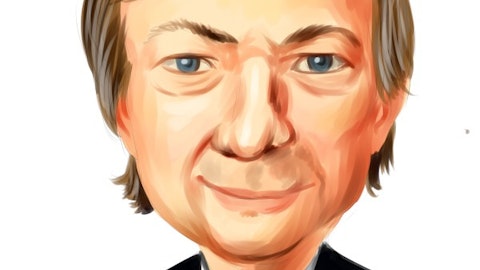We’ve primed our operations with increased inventory, receivables went up, but the cash flow will catch up as those assets turn over. And that’s what’s happening. So, all of this is nothing to — it’s very much expected. Then let’s move on to the balance sheet. I got a few questions there. And first, I just wanted to say on the balance sheet, our working capital has increased by almost $2 million in the past six months. So working capital is current assets minus current liabilities. It’s a major metric as far as liquidity is concerned. That’s a more than 14% increase just in these six months. The profits drive working capital, our financials clearly demonstrate this. Got a couple of questions. It says, all tough sales were very strong, accounts receivable quite high at almost 70%.
Please comment? And again, this kind of goes hand-in-hand with what I just said about the cash burn, the cash flow statement. Generally, we’re selling now to a lot of wholesalers, generally terms are roughly 60 days, 45 days to 60 days or so. So, whereas in the past, we were selling — we were licensing out and the terms were 30 days. So that’s going to lead an increase in your receivables. Again, the number to look at is really the turn of the receivables, and that’s happening. Got another question here on the balance sheet. Is there a plan to pay down debt? And what is the plan or expectation for paying down debt? And — well, we don’t really have that as much debt as it may seem. If you go into the balance sheet and you look, first of all, we have accounts payable, which is just trade payables and we turn that over every 30 days to 45 days.
So that’s normal operations. But then you look at the accrued expenses, which are $11.1 million. And I think it’s note four in the financial statements. More than half of that, $6.4 million is noncash and really the amount that’s showing on the balance sheet is based on the stock price. So this stock price has gone up a lot for this quarter and thankfully, it’s still going up. So that makes that liability number higher, because it will be — this is stock salaries and stock for the directors — for the director fees, which have ended by the way. So as of April 1, we are no longer doing that, but we still have that to be accrued until we issue those shares, which we expect to do this year. So there’s a lot of noncash there. There’s a profit split, which is due to Mikah, which I got another question that.
I’ll talk to you about in a second. That’s $3.4 million, that’s about 90% of our accruals. Then the other part of our debt is a loan from Nasrat and David Caskey, one of our directors of $4 million, which helped us provide the working capital for the launch. So that’s going to be paid within terms. And then the other two items on debt is, we have a bank — a term loan with a bank, East West Bank we’re going to pay that within terms. I think that expires in 2027. And then we have our bonds way back from 20 — 2005. That we’re paying within terms. And I think the last payment is 2030. So when you look at it, we really don’t have much debt at all. We are very strong. Our balance sheet is very strong. We are very unusual in this segment, just because how low the debt is.
So then another question, it’s kind of related to the balance sheet. So I might as well get to on that. And it says, talking about what makes up the $3.4 million accrued expense to Mikah. That has to do with the agreement originally with SunGen back in, I believe, 2017-2018. It was a co-development, essentially of our mixed Amphetamine products. Half of the profits earned are shared with, at that time, SunGen. In the last few years, Mikah had bought out SunGen rights to these profit split. So this is — we would either have to pay it to SunGen or we would have to pay it to Mikah. Mikah gives us a little better payment terms. So we haven’t paid as of the balance sheet date, we haven’t paid yet that amount, but it’s accrued. It would have to be paid anyway and the plans are to get current with Mikah and on these profit splits by the end of this fiscal year.
Let me see it — I think I’m guiding to all the questions that I was asked. So let me just sum things up. Elite is a much different company than it was when I left and it’s much different when — even from a year ago. And this is thanks to the successful launch of Elite label last April. Our revenues are up 65%. Our operating profits are up 73%, our six months revenue are more than triple where we were five years ago for a full year. Our working capital is increasing. Our debt is low. Our balance sheet is strong and strengthening. Much has changed for the better — for the much better over the past year. So, now our CEO, Mr. Nasrat Hakim, will provide his comments.




